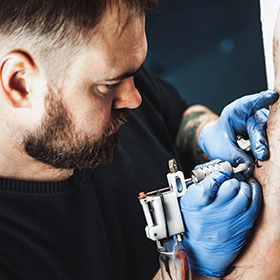Yes, a police officer can have tattoos. But there are rules and limits.
Tattoos are more common now. Many people, including police officers, have them. But, police departments have policies about tattoos. These policies can be strict. They might limit where tattoos can be and what they can show. Some departments allow tattoos as long as they are not offensive or visible while in uniform.
Others may require officers to cover them up. Understanding these rules is important for both current and future officers. This blog will explore these policies. We will look at different departments and their rules. By the end, you will know what is allowed and what is not.
History Of Tattoos In Law Enforcement
Tattoos were once seen as a sign of rebellion. Many people thought that those with tattoos were troublemakers. Police departments had strict rules against them. Officers with tattoos had to cover them up. Some departments even banned tattoos altogether.
Today, attitudes have changed. Many people now see tattoos as a form of self-expression. Some police departments have relaxed their rules. Officers can have tattoos as long as they are not offensive. Visible tattoos are becoming more common in the force. This change reflects the broader acceptance in society.
Common Myths About Police Officers With Tattoos
Some think tattoos make officers look unprofessional. This is a common myth. Many officers have tattoos. They still do their job well. Tattoos do not affect their skills. They do not make them less professional. It is just art on their skin. It does not change who they are.
People also think tattoos link officers to gangs. This is not true. Most tattoos are personal or have a special meaning. They are not gang symbols. Police departments check tattoos. They make sure they are not linked to gangs. Officers with tattoos can still serve and protect us.
Current Policies On Tattoos
Many police departments have rules about tattoos. Some allow tattoos if they are not visible. Others may require tattoos to be covered during work hours. Tattoos on the face or neck are often banned. These rules help maintain a professional image. Each department can have its own guidelines. This means rules can vary a lot.
Policies on tattoos can be different in each region. Some areas have stricter rules. Others may be more relaxed. For example, big cities might have fewer restrictions. Small towns may have stricter guidelines. Regional cultures can influence these policies. It is important to check local rules. This ensures compliance with the right standards.
Impact Of Tattoos On Job Performance
Tattoos on police officers can impact how the public views them. Some people might judge officers with tattoos as less professional. Others might see them as more relatable. This can change how people respond to police. Both in good and bad ways. It’s important for officers to be aware of this. They need to ensure their actions speak louder than their tattoos.
Tattoos can help build bonds between officers. Shared tattoos or similar designs can create a sense of brotherhood. This can lead to better teamwork and trust. But some officers might feel left out if they don’t have tattoos. It’s crucial to foster a culture of inclusion. Everyone should feel like they belong, with or without tattoos.
Case Studies
Some police departments have strict rules about tattoos. Officers must cover tattoos while on duty. These policies aim to keep a professional look. They believe tattoos may affect public trust. In some places, tattoos on hands, neck, or face are not allowed. Tattoos with offensive symbols or words are banned too. Strict policies can limit hiring options. New officers may have to remove or cover tattoos.
Other police departments are more lenient about tattoos. They allow visible tattoos during duty. These departments focus on skills and performance. Tattoos are seen as personal expression. They trust officers to maintain a good image. Lenient policies attract more applicants. Officers feel more comfortable and accepted. Some departments have only a few basic rules for tattoos. Offensive or hate-related tattoos are still not allowed.
Public Opinion
Recent surveys show mixed opinions on police tattoos. Some people believe tattoos are unprofessional. They think a police officer should look clean. Others feel tattoos are a form of personal expression. They argue tattoos do not affect job performance. A smaller group has no strong opinion. They simply do not care about tattoos.
Media shapes opinions on police tattoos. Movies often show tough cops with tattoos. This makes tattoos seem normal. TV shows sometimes feature officers with tattoos. This can also affect views. News stories can influence too. Positive stories about tattooed officers can improve acceptance. Negative stories might do the opposite.
Future Trends
Police officers with tattoos may become more accepted in the future. Many departments are updating policies to reflect changing societal norms.
Evolving Standards
Police departments are changing their views on tattoos. More officers have tattoos now. Many departments are updating their rules. They want to attract more people. Old rules are becoming relaxed.
Some officers cover tattoos while at work. Others show them. It depends on the tattoo and its meaning. Tattoos with offensive images are still not allowed. Positive symbols are more accepted now.
Potential Policy Changes
New policies may come soon. These changes could allow more visible tattoos. Departments will still check tattoo content. No offensive or hateful images will be accepted.
Community views affect these rules too. People are more accepting of tattoos now. Departments want to match community values. This helps build trust. Police and the public will work better together.
Conclusion
Tattoos on police officers can be a complex issue. Policies vary by department. Some allow visible tattoos, others don’t. Personal expression matters, but professionalism is crucial. Tattoos shouldn’t distract or offend the public. Research your department’s rules before getting inked.
Always prioritize the community’s trust and your role’s integrity. Balancing personal style with job requirements is key.

